13 Best AI Writing Tools I've Personally Tested in 2025
Looking for the best AI writing tools? I've personally tested 13 top options in 2025 to help you find the perfect fit for your blogging and marketing needs.

I've spent countless hours testing different AI writers since they first started popping up. Some are great, some are just okay, and some aren't worth your time.
This post cuts through the noise and gives you my straightforward list of the best AI writing tools I've used this year.
TL;DR: Best AI Writing Tools by Category
Here’s a quick rundown of my top picks for specific needs:
- ChatGPT - Best for all around and general writing
- Koala Writer - My personal favorite AI writing tool for website content and blogging.
- Jasper AI – Best for marketing content
- Copy.ai – Best for social media content
- Hypotenuse AI – Best for blog posts and long-form content
- Rytr – Best budget-friendly option
- Sudowrite – Best for creative fiction writing
- Writer.com – Best for enterprises and brand consistency
- Quillbot – Best for paraphrasing and editing
- Anyword – Best for data-driven content
- INK - Good for SEO-focused writing
- SEOWriting - Best for SEO-focused writing
- Claude AI - Large Language Model tool like ChatGPT, one of ChatGPT’s main competitors. Best for sounding Human.
The 13 Best AI Writing Tools (Personally Tested & Recommended)
I've put these tools to the test for my own projects, from building niche websites to creating marketing copy. Each one has its strengths, and the right one for you depends on what you need to accomplish.
Here's a closer breakdown of my top recommendations:
1. Koala Writer
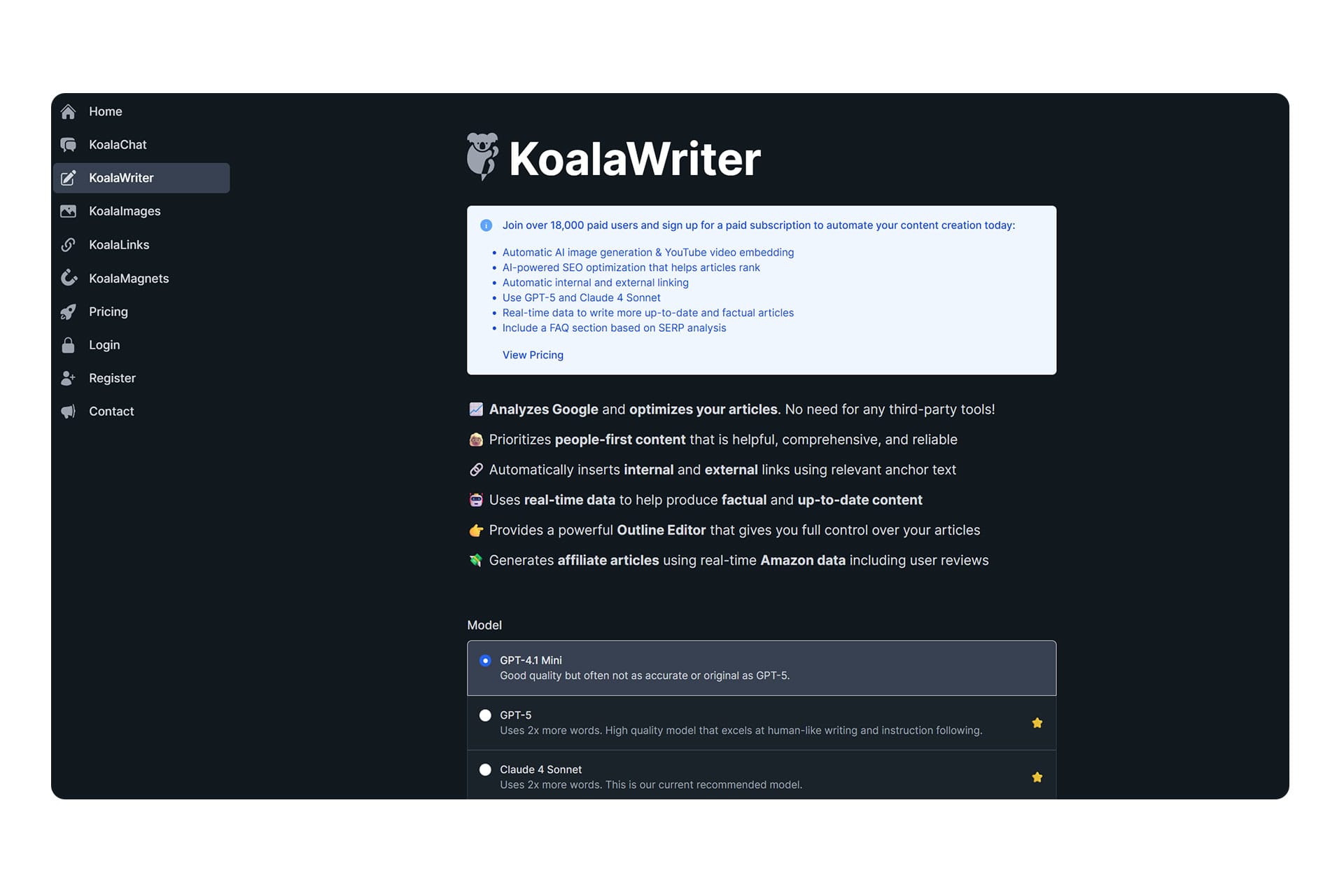
This is my go-to tool and the one I recommend most for bloggers, affiliate marketers, and website owners. Koala Writer is incredibly easy to use and produces high-quality content that sounds surprisingly human.
One of its standout features is the ability to automatically build internal links within the content it creates by referencing your entire website. It can also connect directly to your site and publish articles for you, which saves a ton of time. For anyone serious about creating long-form content for a website, Koala Writer is a top choice. For a deeper dive, read my full review of KoalaWriter.
Pros:
- Produces high-quality, human-sounding content ideal for blogging.
- Excellent SEO features, including automatic internal linking.
- Connects with WordPress for easy, one-click publishing.
- Simple, easy-to-use interface.
Cons:
- Fewer templates for short-form copy compared to marketing-focused tools.
- Can be more expensive than some budget options.
2. ChatGPT

You can't have a list of AI writers without mentioning ChatGPT. It's the tool that brought AI writing to the masses, and it's still one of the most versatile options available. I use it for everything from brainstorming ideas and creating outlines to writing quick emails and social media posts.
Its conversational nature makes it easy to use. You just give it a prompt, and it gives you a response. Now, both free and paid users get access to the power of ChatGPT 5. They've also added a "thinking mode," which takes a bit longer to generate answers but often produces much more well-thought-out content. It's still a solid all-around tool for almost any writing task.
Pros:
- Extremely versatile for almost any writing task.
- Easy-to-use conversational interface.
- The "thinking mode" produces well-thought-out content.
- A powerful free version is available.
Cons:
- Outputs can be generic without highly detailed prompts.
- Information must be fact-checked for accuracy.
3. Jasper AI

Jasper AI (formerly Jarvis) was one of the first big names in the AI writing space, and it's built a strong reputation for marketing content. It has a massive library of templates for things like ad copy, product descriptions, email subject lines, and video scripts.
Jasper is particularly good at maintaining a specific brand voice. You can feed it information about your company, and it will generate copy that aligns with your style. If your main goal is creating marketing materials, Jasper has the specialized tools to get the job done effectively.
Pros:
- Excellent for writing all types of marketing copy.
- Massive library of templates for specific use cases.
- Strong brand voice and style guide features.
- Great community and support resources.
Cons:
- One of the more expensive tools on the market.
- Can have a steeper learning curve for new users.
4. Copy.ai

If social media is your focus, Copy.ai is a fantastic option. It shines when it comes to generating short-form content like Instagram captions, tweets, and Facebook posts. Like Jasper, it has a wide array of templates that make it simple to create content for different platforms.
What I like about Copy.ai is its user-friendly interface. It's clean and easy to get started with, even if you've never used an AI writer before. It’s a great tool for social media managers or small business owners who need to create engaging posts quickly.
Pros:
- Specializes in high-quality social media content.
- Very intuitive and user-friendly interface.
- Offers a good free plan to get started.
- Large selection of templates for short-form copy.
Cons:
- Not the strongest option for long-form blog posts.
- The output can sometimes be repetitive.
5. Hypotenuse AI

Hypotenuse AI is another strong contender for blog posts and long-form articles. I was impressed with its blog article wizard, which guides you through the process of creating a full-length post, from title to conclusion. It also has a feature called "Content Detective" that helps pull factual information into your articles.
I did a full review on this tool, and it stands out for its structured approach to content creation. If you want a tool that helps you build articles step-by-step, Hypotenuse is worth a look. You can find more details in my full Hypotenuse AI review.
Pros:
- Step-by-step wizard makes creating blog posts simple.
- "Content Detective" feature helps with factual accuracy.
- Good at producing structured, long-form content.
Cons:
- The user interface isn't as polished as some competitors.
- The credit-based system can be confusing at first.
6. Rytr

For those on a tight budget, Rytr is an excellent choice. It offers a generous free plan and its paid plans are some of the most affordable on the market. Despite its low price, Rytr is surprisingly capable.
It has over 40 use cases, including blog writing, email, and ad copy. The quality might not always be on par with more expensive tools like Jasper or Koala, but for quick drafts or idea generation, it provides incredible value for the cost.
Pros:
- Extremely affordable and offers a great free plan.
- Simple and fast interface that's great for beginners.
- Supports over 30 languages.
- Good for generating quick ideas and short-form content.
Cons:
- Output quality can be less consistent than premium tools.
- Not as powerful for complex, long-form articles.
7. Sudowrite
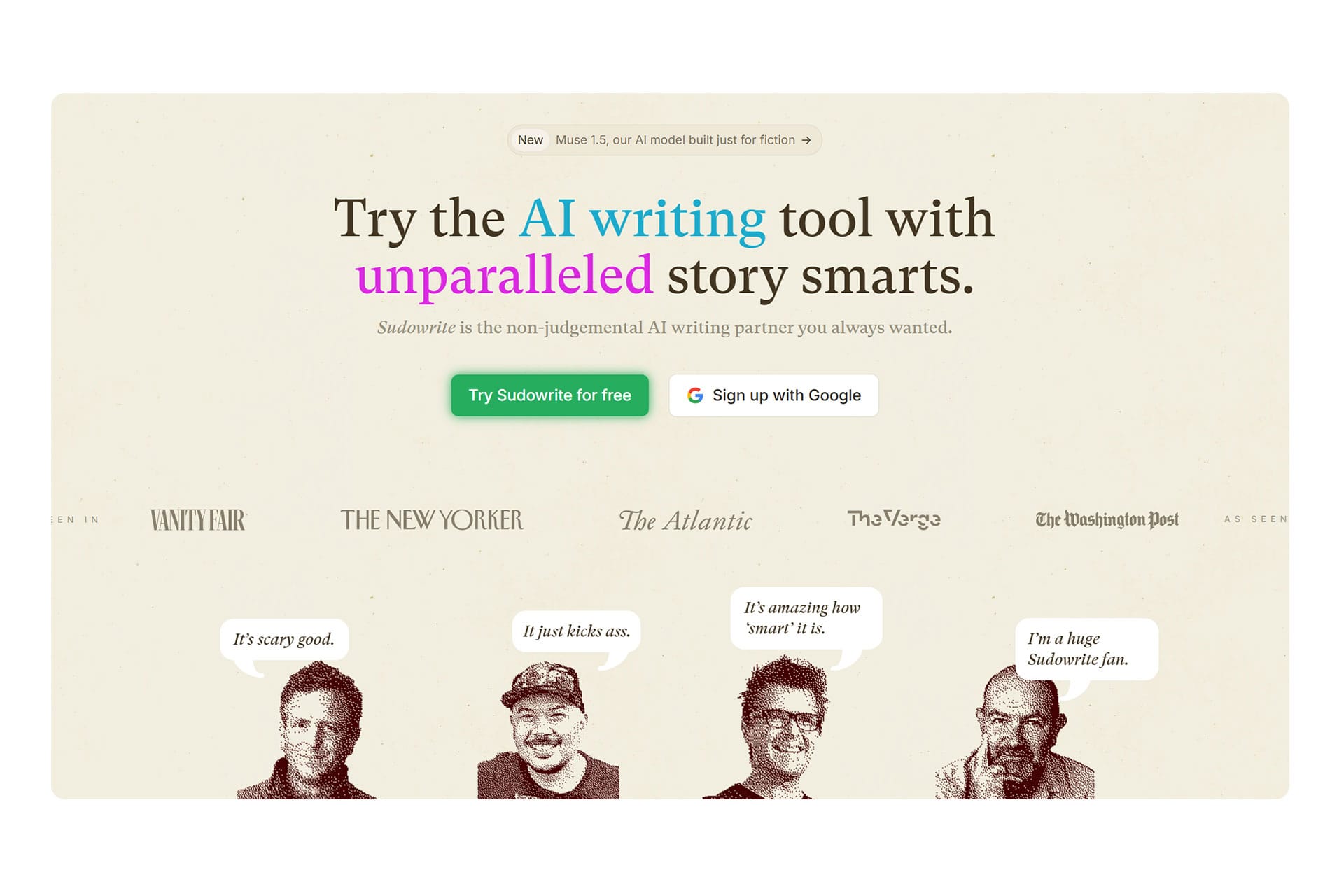
This one is for all the creative writers out there. Sudowrite is built specifically for writing fiction, like novels and short stories. It can help you brainstorm plot points, describe characters, or even rewrite a paragraph in a different tone.
It's like having a creative writing partner that never runs out of ideas. If you're an author experiencing writer's block or just want a tool to help expand your creative possibilities, Sudowrite is in a class of its own.
Pros:
- Designed specifically for fiction and creative writing.
- Excellent for brainstorming and overcoming writer's block.
- Unique features like "Describe," "Twist," and "Brainstorm."
- Helps expand on ideas and enrich descriptions.
Cons:
- Not suitable for marketing, SEO, or blog content.
- The niche focus makes it irrelevant for most business users.
8. Writer.com

Writer.com is geared toward enterprises and large teams. Its main focus is on maintaining brand consistency across all company communications. You can create a detailed style guide, and the AI will ensure that all content written by the team adheres to it.
It checks for everything from brand voice and terminology to grammar and clarity. For large organizations where multiple people are creating content, Writer.com is an invaluable tool for keeping everyone on the same page.
Pros:
- Excellent for maintaining brand consistency across large teams.
- Allows for in-depth, customizable style guides.
- Strong security and compliance features for enterprises.
- Integrates with many popular business tools.
Cons:
- Overkill and too expensive for individual users or small businesses.
- More focused on content governance than pure generation.
9. Quillbot

While many know Quillbot as a paraphrasing tool, it's so much more than that. It’s a full writing assistant that can help you rephrase sentences, check for grammar, summarize long texts, and even generate citations.
I find it most useful during the editing process. When a sentence doesn't sound quite right, I can pop it into Quillbot and see several different ways to phrase it. It’s a great tool for polishing your writing and improving clarity.
Pros:
- Best-in-class tool for paraphrasing and rewording sentences.
- Includes a strong grammar checker and summarizer.
- Co-writer feature helps combine research and writing.
- Great for academic writing and editing.
Cons:
- The AI writer is not as powerful as dedicated content generators.
- The free version is quite limited in functionality.
10. Anyword
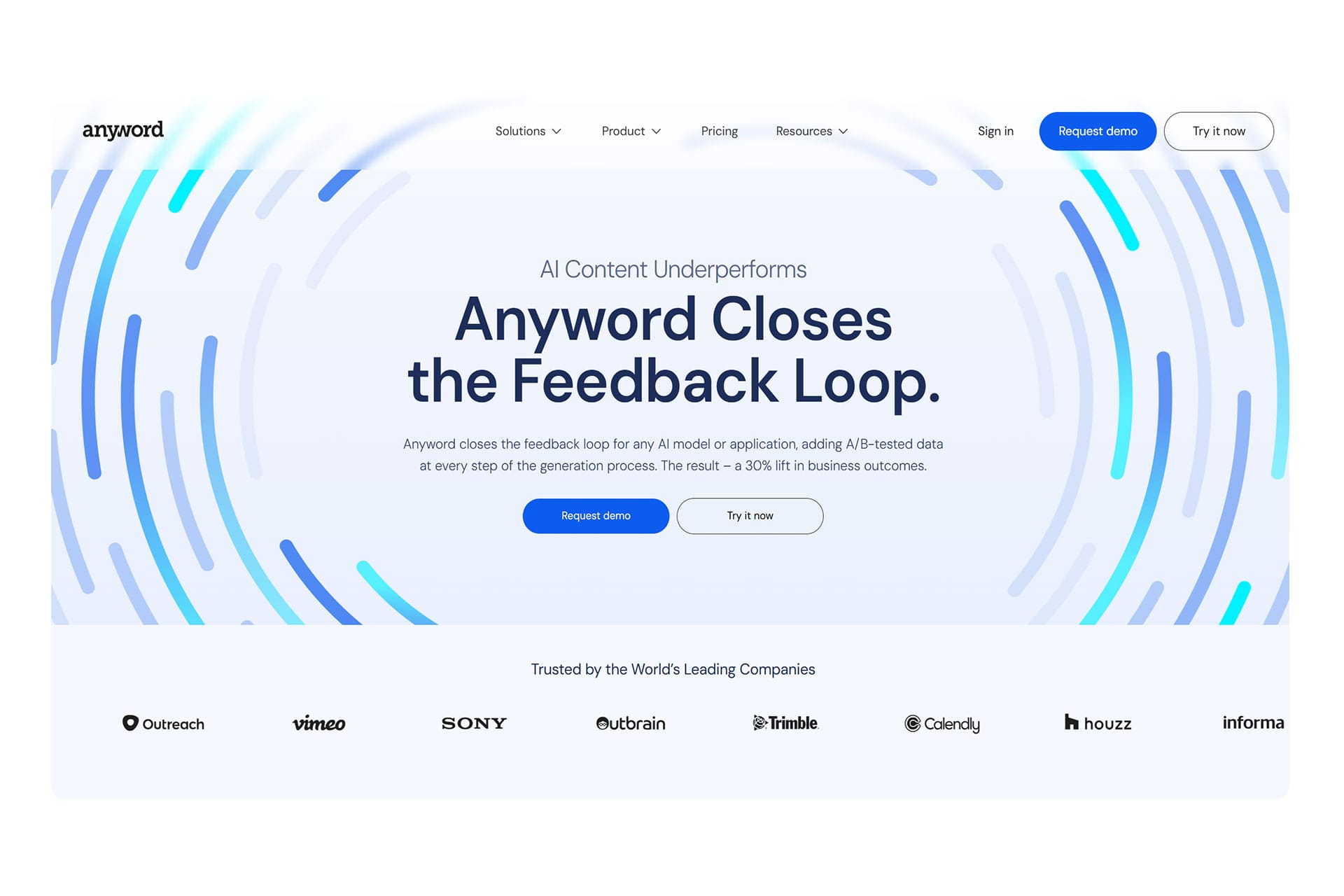
Anyword is all about performance. It uses a data-driven approach to help you create copy that converts. When you generate content, it provides a predictive performance score, giving you an idea of how well it will resonate with your audience.
This is super useful for marketers writing ad copy, landing pages, or emails. Instead of guessing which headline will work best, Anyword gives you data to back up your decisions.
Pros:
- Predictive scoring helps optimize copy for conversions.
- Excellent for data-driven marketers.
- A/B tests headlines and copy variations.
- Custom brand voice features.
Cons:
- More expensive than many other copywriting tools.
- Primarily focused on conversion copy, not general content creation.
11. INK
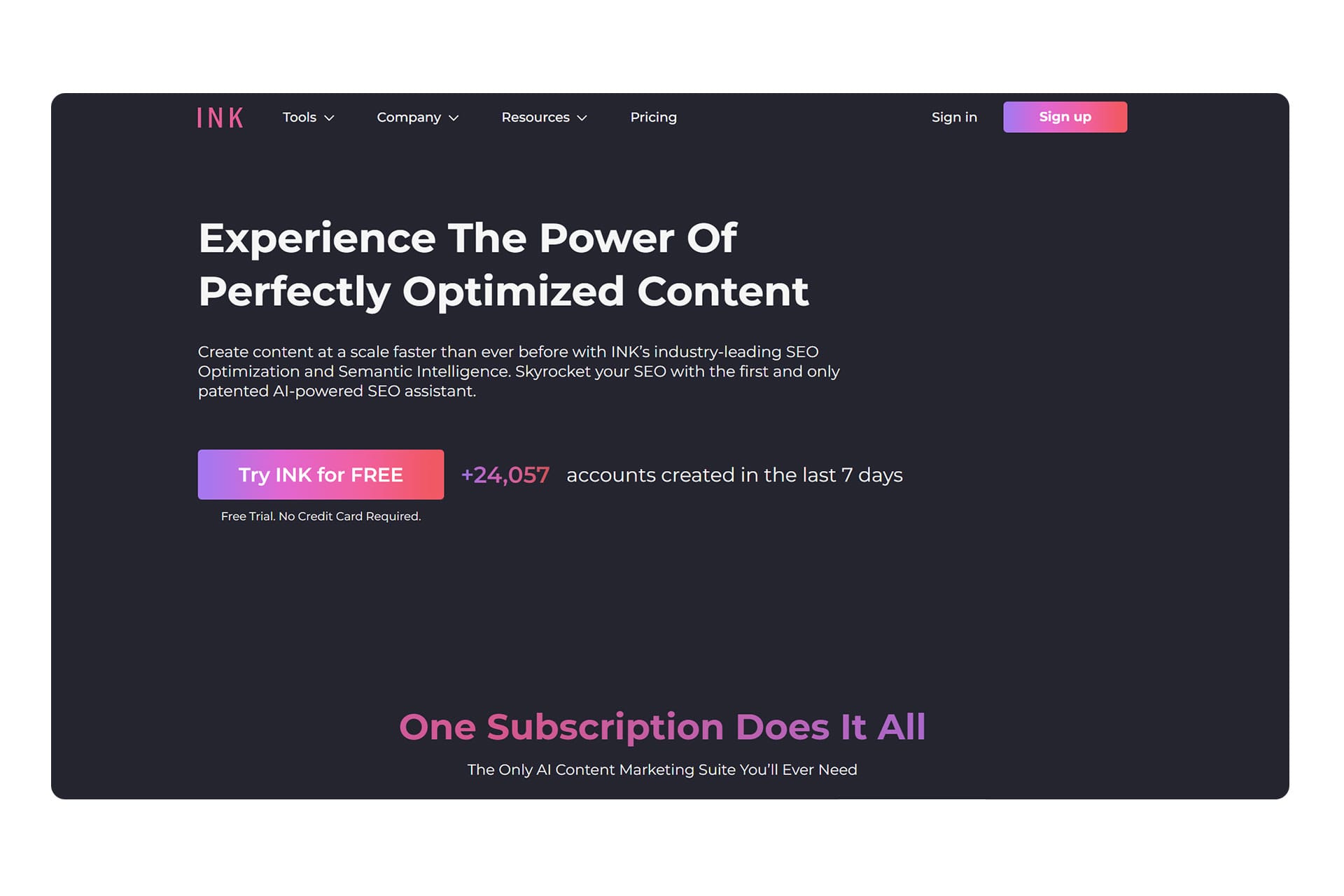
INK (also known as INKforall) is a writing tool with a heavy emphasis on SEO. It combines an AI writer with a content optimization tool. As you write, it gives you an "SEO score" and provides suggestions on how to improve your content to rank better in search engines.
It feels like a mix between an AI writer and a tool like SurferSEO. If you want an all-in-one solution for both writing and optimizing your content for Google, INK is a solid option.
Pros:
- All-in-one tool for writing and SEO optimization.
- Real-time SEO score and suggestions are very helpful.
- Content planner helps organize your strategy.
- Includes AI image generation.
Cons:
- The interface can feel busy with so many features.
- The subscription can be pricey compared to using separate, specialized tools.
12. SEOWriting.ai
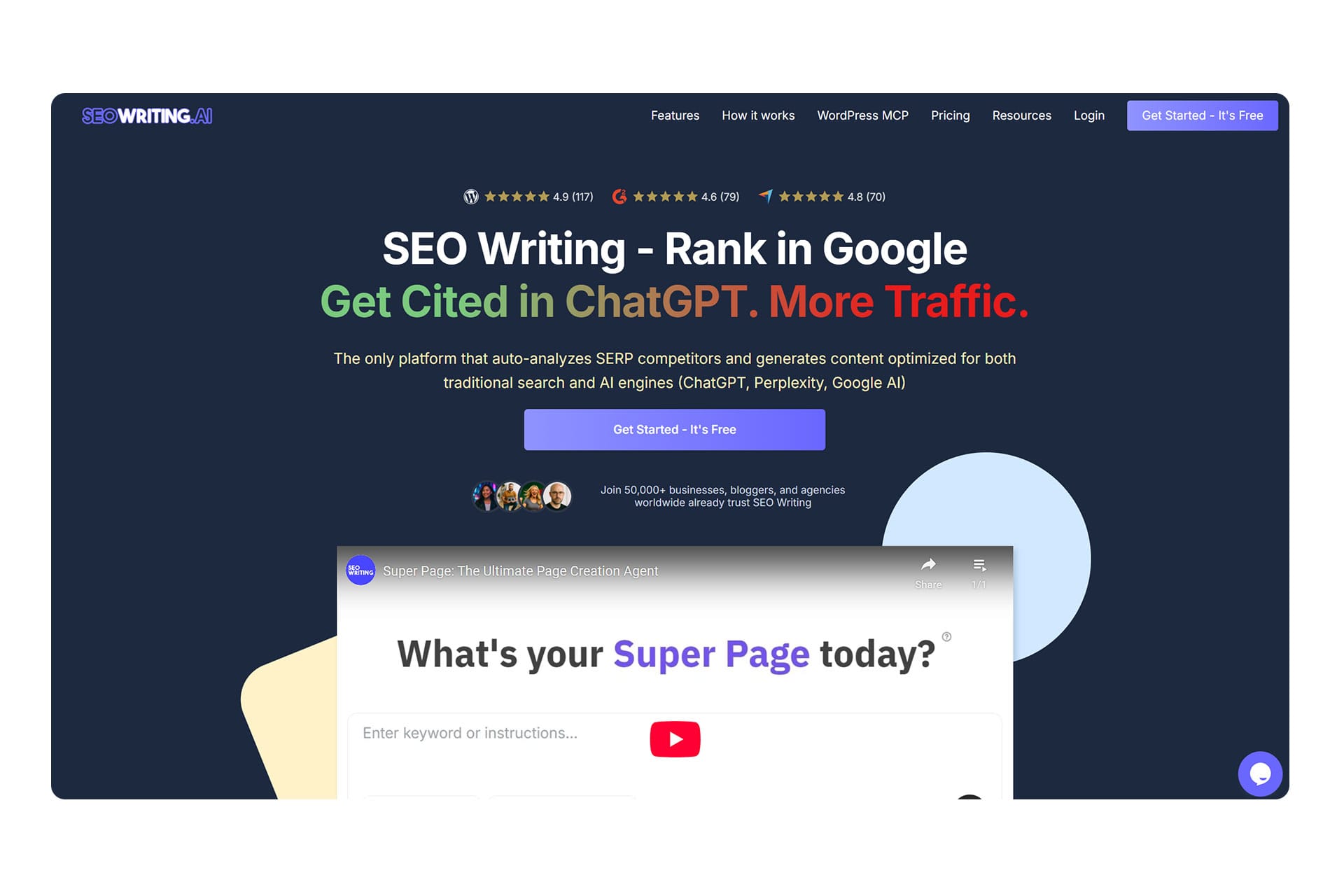
This is my second favorite tool on the list, and for good reason. As the name suggests, SEOWriting.ai is built from the ground up for SEO content, and it does the job automatically. It's incredibly easy to use and excels at creating long-form articles in just a few clicks.
The pricing is another huge plus; you get a ton of high-quality content for what you pay. For niche site builders and affiliate marketers who need to produce a lot of articles quickly, this tool can seriously speed up the workflow while being easy on the wallet.
Pros:
- Automates much of the SEO article creation process.
- Excellent value, offering a lot of content for the price.
- Very easy to use, even for beginners.
- Great for quickly producing first drafts of articles.
Cons:
- Output requires human editing to ensure quality and uniqueness.
- Less versatile for non-SEO writing tasks.
13. Claude AI
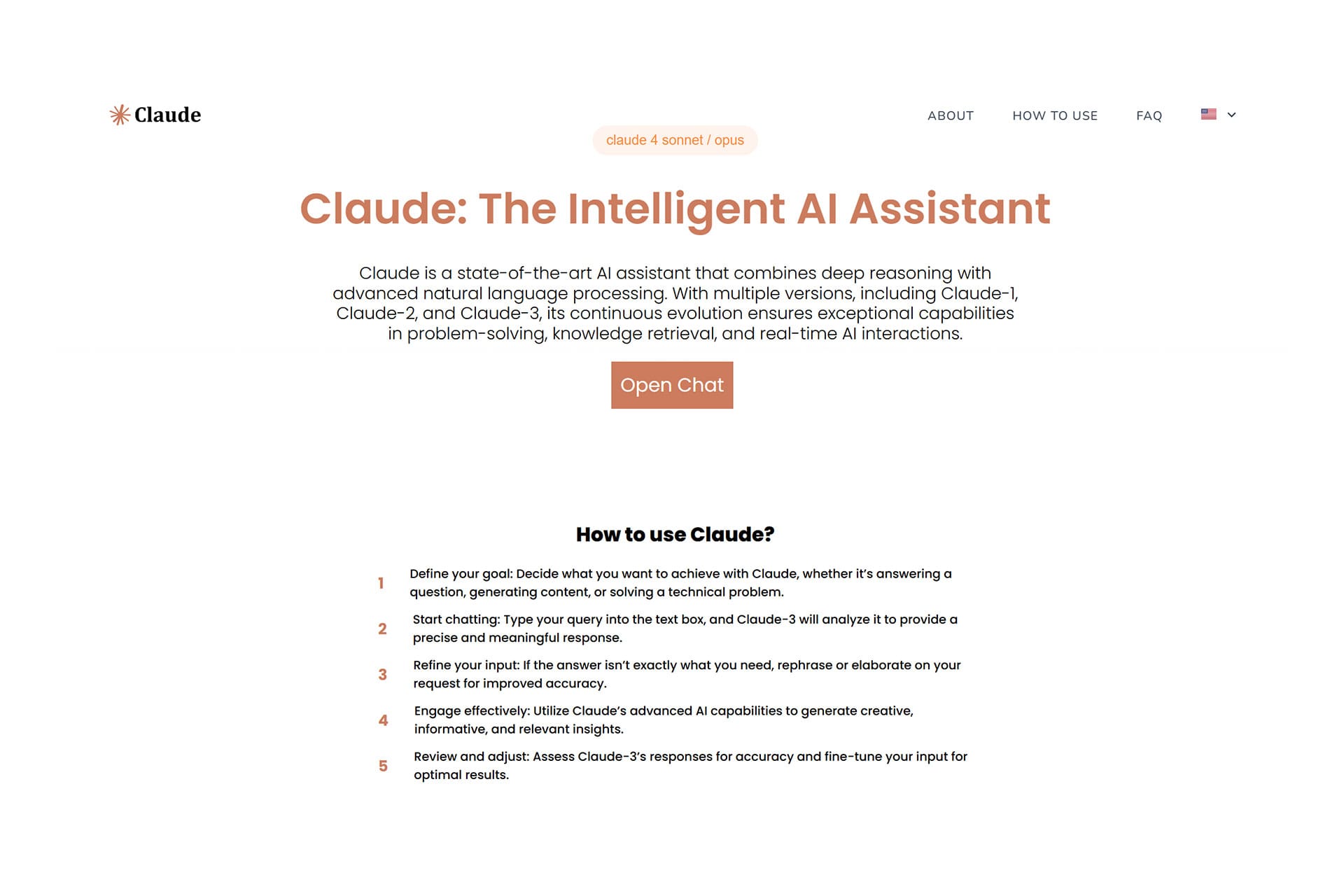
Claude AI is my third favorite choice and my favorite Large Language Model (LLM) overall. I've been on the Pro plan, which is about $20 a month, for the last two years, and I use it daily. It's my go-to for writing my YouTube titles and descriptions.
When I need really good content created, this tool works like a charm. You can train it using custom knowledge, and you can also create what's called a "project" that will handle repeat tasks for you anytime. For top-tier content and custom workflows, Claude is a powerhouse.
Pros:
- Produces exceptionally natural and human-sounding text.
- "Projects" feature is great for repeatable, custom tasks.
- Can be trained on custom knowledge for personalized output.
- Large context window is useful for long documents and chats.
Cons:
- Fewer built-in templates compared to tools like Jasper.
- Real-time web search can be less reliable than some competitors.
Why Trust My Recommendations?
With so many software reviews out there, it's fair to ask why you should listen to mine. My approach has always been about transparency and hands-on testing.
Here's why you can trust what I share:
I’ve personally tested each AI writing tool
I don't just read a features list and call it a day. I buy the software, spend hours using it for real-world tasks, and figure out what it does well and where it falls short. Everything on this list is a tool I have personally used in my own business.
No sponsored bias
My reviews are not sponsored. I give my honest opinion, covering both the good and the bad. My goal is to help you make an informed decision, not to push a particular product. My subscribers value this direct and authentic approach.
AI Writing Tool Limitations You Should Know
AI writing tools are powerful, but they aren't perfect. It's important to go in with realistic expectations and understand their current limitations.
Here are a few things to keep in mind:
Sometimes outputs are too generic
AI models are trained on vast amounts of internet text, so their output can sometimes feel a bit generic or cliché. They often lack the personal stories, unique opinions, and distinct voice that make human writing compelling.
Accuracy is hit-or-miss
AI can and does make things up. This is often called "hallucination." It's critical to fact-check any information, especially data, statistics, or historical facts, that an AI writer generates. Never assume the output is 100% accurate.
Style and brand voice may need adjustments
While some tools are getting better at mimicking a specific brand voice, you'll almost always need to do some editing to make the content truly sound like you or your brand. The final polish still requires a human touch.
Summary
AI writing tools have come a long way and can be a massive help for content creators, marketers, and business owners. The key is to find the right tool for your specific needs and to remember that it's an assistant, not a replacement for a human writer.
Whether you need a budget-friendly option like Rytr, a marketing powerhouse like Jasper, or my personal favorite for blogging, Koala Writer, there's a tool on this list that can help you.
FAQs
Which AI writing tool is best for beginners?
For beginners, I would recommend either Rytr or Koala Writer. Rytr is extremely budget-friendly and has a simple, clean interface that's easy to figure out. Koala Writer, while more advanced, is also very intuitive and guides you through the process of creating a high-quality blog post, making it a great starting point for new bloggers.
Can AI writing tools replace human writers?
No, at least not yet. AI writing tools are best thought of as powerful assistants. They can handle the heavy lifting of research and first drafts, which can speed up the content creation process significantly. However, they still lack the creativity, critical thinking, and emotional understanding that a human writer brings. The best results come from a collaboration between human and AI, where the AI generates the draft and the human refines, edits, and adds their personal touch.


